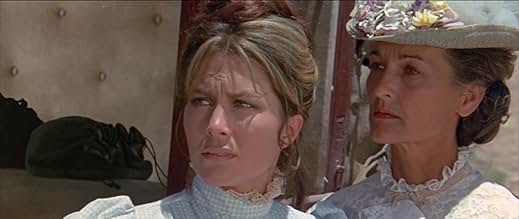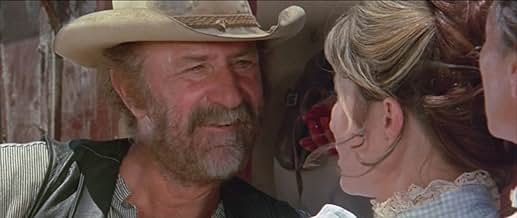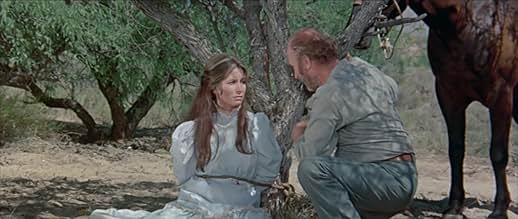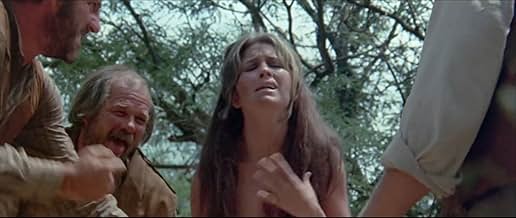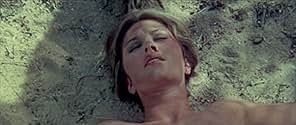अपनी भाषा में प्लॉट जोड़ेंA woman tracks down the five men who raped her, helped by an Apache.A woman tracks down the five men who raped her, helped by an Apache.A woman tracks down the five men who raped her, helped by an Apache.
Joe Turkel
- Peyote
- (as Joseph Turkel)
William Bryant
- Sheriff Martin Lord
- (as Bill Bryant)
Steve 'Bunker' de France
- Tucson Deputy
- (as Steve Michel De France)
फ़ीचर्ड समीक्षाएं
5JHC3
Schoolteacher Alice McAndew (Carey) has the misfortune of sharing a stagecoach with prisoner Pudge Elliott (Wynn). When Pudge's friends arrive to rescue him, they don't stop at simply robbing the stage. All aboard are killed except Alice. Her intended fate is far worse. She is hauled into the desert to be repeatedly and brutally raped and left for dead.
The outlaws' plan goes awry when an Apache (Silva) saves Alice from a cruel death from shock and dehydration. He nurses the young woman back to health. Before long, the two start hunting down the killers.
By 1970 standards, this is a fairly extreme western. The rape scene is not lingered on, but is filmed in such a way as to instill shock in the viewer. The film has a few rare humorous elements, but is otherwise a deadly serious tale of revenge. Henry Silva's character has little dialogue and virtually no knowledge of English. The filmmakers rely instead on imagery and expressions to tell the story more than the spoken language.
For me, the film was passable. I personally couldn't find much to fault in the approach taken. Some plot elements are strong, but cannot be stated here without becoming spoilers. The cast is good and consists largely of veterans of the western genre. The minimal dialogue was a good choice. The rape scene is not exploitative. Perhaps it is because this vengeance theme has been done so much that I couldn't really get into the film. For western traditionalists, this might be one to avoid.
The outlaws' plan goes awry when an Apache (Silva) saves Alice from a cruel death from shock and dehydration. He nurses the young woman back to health. Before long, the two start hunting down the killers.
By 1970 standards, this is a fairly extreme western. The rape scene is not lingered on, but is filmed in such a way as to instill shock in the viewer. The film has a few rare humorous elements, but is otherwise a deadly serious tale of revenge. Henry Silva's character has little dialogue and virtually no knowledge of English. The filmmakers rely instead on imagery and expressions to tell the story more than the spoken language.
For me, the film was passable. I personally couldn't find much to fault in the approach taken. Some plot elements are strong, but cannot be stated here without becoming spoilers. The cast is good and consists largely of veterans of the western genre. The minimal dialogue was a good choice. The rape scene is not exploitative. Perhaps it is because this vengeance theme has been done so much that I couldn't really get into the film. For western traditionalists, this might be one to avoid.
The sort of movie where the Native American outfits appear to have come from Woolworth complete with rawhide leather go-go boots. The multiple titles alone tip you off it was hastily made for the bottom half of drive-in bills. It's sort of interesting in how it reflects (or panders to) the spirit of the late 60's/early 70's: protofeminist condemnation of rape, and peacenik condemnation of revenge. Meanwhile the viewers are supposed to get their kicks from the aforementioned acts, though at least the rape happens off-screen. Also typical of movies at the time, the story is bleak and pessimistic but for once mercifully short. Still it's worthy as a vehicle for Keenan Wynn, known for playing endearing cantankerous roles like Alonzo P. Hawk in the Disney Flubber movies. Here he has a scenery-chewing good time as a genuinely nasty bad guy, and he looks radiantly fit in his S & M-tinged nude scene. Another bonus is the theme music by future pina colada songwriter & Broadway director Rupert Holmes.
A young lady is manhandled after a stagecoach robbery in Arizona and left for dead (Carey), but a solitary Apache patiently sees to her restoration (Silva). They eventually team-up to pursue justice. John Anderson plays the righteous lawman that heads the posse while Keenan Wynn is on hand as the leader of the thug scum.
"The Animals" (1970), also known as "Five Savage Men," is an obscure 'B' Western that was the blueprint for "Hannie Caulder" (1971) and "I Spit on Your Grave" (1978). Michele was 27 during shooting and one of the most beautiful women on earth at the time. You might remember her from "El Dorado" (1966), "Live a Little, Love a Little" (1968) and "Dirty Dingus Magee" (1970).
The score was written by Rupert Holmes, known for his hit "Escape (The Pina Colada Song)." It starts out dubious because it's mod-ish and seemingly unfitting for a movie that takes place in the Old West, but other Westerns had already set this precedent in the 60s. Thankfully, the music improves with some parts featuring notable percussive pieces and others that are moving.
Most of the reviews are pretty low, but I'm sure this is due to the lousy first impression of the score and other technical deficiencies of what is likely the only print available. Sure, it's low budget and reminiscent in tone of the contemporaneous "Cry Blood, Apache," but it's superior to that barbaric and dismal revenge yarn.
For instance, it's more than just a brutal crime/revenge flick as the center of the story focuses on a noble 'savage' who contrasts the five Caucasian savages from the first act. He develops a successful cross-cultural relationship with the white woman back when it was socially unacceptable on either side. For anyone who argues that this is unrealistic, Apache men back then were people just like you and me today. They weren't all cookie-cutter. One or two here and there were more individualistic compared to the typical brave and could even be viewed as outcasts. That seems to be the case here.
The last act switches to the expected vengeance à la "Hang 'Em High" (1968), but the climax is surprising, offering a lesson on how even a noble individual can grossly misjudge another person (or people) & situation, and actually commit a crime. That's why the bible advises not judging until enough accurate info is acquired to make a just assessment; and, even then, you have to be careful.
There are unexpected creative bits as well, like the well-done Apache stare-down sequence and the fistfight over the saloon lass in the street.
I also disagree that "The Animals" can be written off as a rip-off of Spaghetti Westerns. It's an American production shot completely in Arizona and I could cite numerous American Westerns as influential. Don't think for a second that Sergio Leone's "Man With No Name" trilogy was wholly original. For instance, Ennio Morricone's score for "A Fistful of Dollars" features a moving piece glaringly inspired by Dimitri Tiomkin's outstanding "El Degüello" from "Rio Bravo" (1959).
Lastly, unlike the typical Italian Western caricatures, this flick provides actual characters. The core relationship is actually touching and so the flick scores well in the human interest department.
The film runs 1 hour, 26 minutes, and was shot in Arizona, e.g. Saguaro National Park, Old Tucson, Sonoran Desert, Sierrita Mountains and Santa Cruz River.
GRADE: B.
"The Animals" (1970), also known as "Five Savage Men," is an obscure 'B' Western that was the blueprint for "Hannie Caulder" (1971) and "I Spit on Your Grave" (1978). Michele was 27 during shooting and one of the most beautiful women on earth at the time. You might remember her from "El Dorado" (1966), "Live a Little, Love a Little" (1968) and "Dirty Dingus Magee" (1970).
The score was written by Rupert Holmes, known for his hit "Escape (The Pina Colada Song)." It starts out dubious because it's mod-ish and seemingly unfitting for a movie that takes place in the Old West, but other Westerns had already set this precedent in the 60s. Thankfully, the music improves with some parts featuring notable percussive pieces and others that are moving.
Most of the reviews are pretty low, but I'm sure this is due to the lousy first impression of the score and other technical deficiencies of what is likely the only print available. Sure, it's low budget and reminiscent in tone of the contemporaneous "Cry Blood, Apache," but it's superior to that barbaric and dismal revenge yarn.
For instance, it's more than just a brutal crime/revenge flick as the center of the story focuses on a noble 'savage' who contrasts the five Caucasian savages from the first act. He develops a successful cross-cultural relationship with the white woman back when it was socially unacceptable on either side. For anyone who argues that this is unrealistic, Apache men back then were people just like you and me today. They weren't all cookie-cutter. One or two here and there were more individualistic compared to the typical brave and could even be viewed as outcasts. That seems to be the case here.
The last act switches to the expected vengeance à la "Hang 'Em High" (1968), but the climax is surprising, offering a lesson on how even a noble individual can grossly misjudge another person (or people) & situation, and actually commit a crime. That's why the bible advises not judging until enough accurate info is acquired to make a just assessment; and, even then, you have to be careful.
There are unexpected creative bits as well, like the well-done Apache stare-down sequence and the fistfight over the saloon lass in the street.
I also disagree that "The Animals" can be written off as a rip-off of Spaghetti Westerns. It's an American production shot completely in Arizona and I could cite numerous American Westerns as influential. Don't think for a second that Sergio Leone's "Man With No Name" trilogy was wholly original. For instance, Ennio Morricone's score for "A Fistful of Dollars" features a moving piece glaringly inspired by Dimitri Tiomkin's outstanding "El Degüello" from "Rio Bravo" (1959).
Lastly, unlike the typical Italian Western caricatures, this flick provides actual characters. The core relationship is actually touching and so the flick scores well in the human interest department.
The film runs 1 hour, 26 minutes, and was shot in Arizona, e.g. Saguaro National Park, Old Tucson, Sonoran Desert, Sierrita Mountains and Santa Cruz River.
GRADE: B.
Henry Silva has been a long time favorite actor for years. I first saw him in an exceptional film called 'Johnny Cool.' In this western, originally called " Five Savage Men ", now entitled " The Animals " offering he plays Chatto a well known Apache warrior who comes across a motley group of bandits who have robbed a stage, murdered it's passengers and kidnapped a schoolteacher. Having had their way with the hapless school ma-rm, the gang splits up and go their separate way. Helped to recover by our Hero (Its nice to see Silva as the good guy), Alice McAndrew(Michele Carey) sets out to exact revenge against the five men. With an experienced Lawman Allan Pierce (John Anderson) and posse hot on their trail, the gang led by Pudge Elliott (Keenan Wynn) each take different trails. This movie plot is not unique as later mirrored by the succeeding film Hannie Caulder. What is unusual is that despite his commanding presence, Silva as Chato is seen as restrained in his role and the movie is hampered by the snail pace directing of Ron Joy. Still, it's a rather dramatic change to see a gun-toting female seeking violent revenge on her attackers. In addition, the formula of Whites against Indians does put a damper on the outcome and experienced audiences will guess the ending. ***
Was generous with a 4 rating. Interesting scenery. Poor directing. Questionable if editing was bad or that was all they had to work with. Silva is virtually mute so writers weren't necessary.
क्या आपको पता है
- ट्रिवियाOnly career nude scene for Michele Carey.
- भाव
Posseman #1: Allan! Allan! Pieces of a woman's dress... stakes...
Sheriff Allan Pierce: Stripped her down... Stripped her down and tied her up... sons of bitches!
- कनेक्शनFeatured in 42nd Street Forever! Volume 1: Horror on 42nd Street (2004)
टॉप पसंद
रेटिंग देने के लिए साइन-इन करें और वैयक्तिकृत सुझावों के लिए वॉचलिस्ट करें
- How long is The Animals?Alexa द्वारा संचालित
विवरण
- चलने की अवधि
- 1 घं 26 मि(86 min)
- ध्वनि मिश्रण
- पक्ष अनुपात
- 2.35 : 1
इस पेज में योगदान दें
किसी बदलाव का सुझाव दें या अनुपलब्ध कॉन्टेंट जोड़ें

